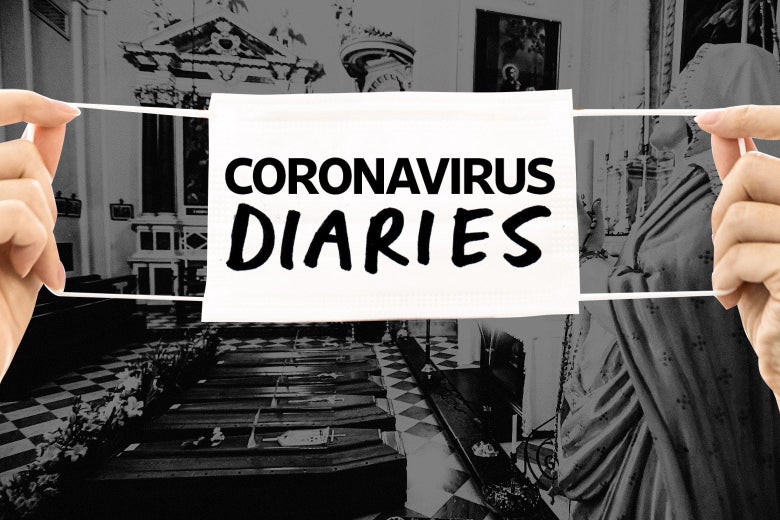
Photo illustration by Slate. Photo by Piero Cruciatti/AFP via Getty Images.
Coronavirus Diaries is a series of dispatches exploring how the coronavirus is affecting people’s lives. For the latest public health information, please refer to the Centers for Disease Control and Prevention’s website. For Slate’s coronavirus coverage, click here.
This as-told-to essay, from Roberta Zaninoni, a 31-year-old living in Val Seriana, Bergamo, has been transcribed and edited for clarity by Greta Privitera.
When they say only old people die, I go mad. One of those old men who died was my father. His name was Giuseppe Zaninoni, a 72-year-old who was in excellent health until three weeks ago. When this damned epidemic started, I never thought that I would be among those children who cry alone, locked in their houses, from the loss of a parent. But so it is. I am from Val Seriana, in the province of Bergamo, one of the cities most affected by COVID-19 in Italy. My life and that of my family changed suddenly. It was a Saturday, I remember it well, my brother called me and told me that dad had a bit of the flu, nothing serious. Sure, the coronavirus was already around, but he was fine, so much so that he wanted to go out for a little ride around the house. Fortunately we told him not to go anywhere. We weren’t worried that something bad might happen to him, we still didn’t have a sense of how vicious the virus was here.
On Sunday my dad started to feel a little worse. By Monday evening my brother and my father’s partner decided to take him to the hospital, against his will. I was in Albania, and still am, I cannot come back because of the lock down. On the phone, they had reassured me, his fever didn’t hit 100, he had a little cough and his throat was dry, he felt weak, but seemed OK. They admitted him at the hospital in Alzano Lombardo. The moment he walked through the door of the emergency room our family ended. We spoke on Tuesday, even though he was on a respirator, then his phone died and we never heard his voice again. He had forgotten the charger at home. From that moment we only spoke to the doctors, the only link between the families and the patients. On Wednesday they told us that the situation had worsened but that my dad was still quite well and that he sent his greetings. We were still positive that he would make it. The first time I thought about death was Thursday morning, when we learned the saturation of oxygen in his blood was low, I knew he let himself go.
Doctors are heroes, but in this emergency they don’t always manage to do their job the right way, there are too many sick people, there are not enough beds, respirators, or masks. I have a feeling that they can’t do things the way they want. In a normal situation, my father would have lived. He was never intubated, who knows why, perhaps there was no room for him. On Friday his condition became critical. We asked the doctors to pass him our messages, my brother told him: “Man up, dad.” and I said, “your daughter Roberta and your granddaughter Vittoria love you endlessly.” The doctor on the phone told me that dad smiled and tears dripped down his eyes. Two hours later another doctor from a new shift called me: “I’m sorry, your dad has passed.”
I started to cry and I didn’t believe it, I asked him, “Doctor, are you sure? Are you sure he’s my dad?” I asked him to go check that it really is Giuseppe Zaninoni. It couldn’t be true. My dad died alone, lucid, he knew what was going on. He died suffocated by a virus that devastated his lungs.
I wish the doctors would send me a picture of you. I know, it may seem like a macabre request, but I needed to see it to make peace with the idea that it had really happened, to believe it. I would have prayed on that photo. And now I’m here, alone with this immense pain, locked in a house hundreds of miles away from my family. I can’t hug my brother, who is destroyed. No funeral, no goodbye, if not in a few weeks or months, who knows. We are alone, in a solitude that I have never known.
Every morning I turn on my cell phone and see dozens of messages from friends telling me that they have lost their mom, uncle, grandfather. I get angry because I think: if politicians had moved faster, if they had closed everything before, now my father would be alive. If people had stopped taking walks, if factories had closed, maybe I wouldn’t have experienced all of this. Did my father die to save a country’s economy?
In our deserted Bergamo, we only hear the sound of ambulances and death bells. Nobody has flash mobs on their balconies, here we mourn. The price we are paying is too high.
Giuseppe Zaninoni was a strong man. He should have lived.
Readers like you make our work possible. Help us continue to provide the reporting, commentary and criticism you won’t find anywhere else.
Join Slate Plusfrom Slate Magazine https://ift.tt/3arksTH
via IFTTT
沒有留言:
張貼留言